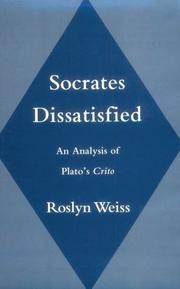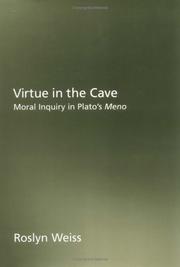| Listing 1 - 7 of 7 |
Sort by
|
Book
ISBN: 9780801449741 080144974X Year: 2012 Publisher: Ithaca (N.Y.) Cornell university press
Abstract | Keywords | Export | Availability | Bookmark
 Loading...
Loading...Choose an application
- Reference Manager
- EndNote
- RefWorks (Direct export to RefWorks)
"Roslyn Weiss offers a new interpretation of Platonic moral philosophy based on an unconventional reading of the Republic. Her basic argument begins with the point that Plato means for us to react badly to the philosopher-rulers of Book 7. She then makes the case that there are two distinct kinds of philosopher in the Republic--one that is ideal and one that is farcical--and that each represents a separate type of justice. Finally, she argues that Plato recognizes this dualism and points the way toward a resolution"--Publisher's Web site.
Justice (Philosophy) --- Ethics. --- Justice (Philosophie) --- Morale --- Plato. --- Plato --- Ethics --- Philosophy --- Deontology --- Ethics, Primitive --- Ethology --- Moral philosophy --- Morality --- Morals --- Philosophy, Moral --- Science, Moral --- Values

ISBN: 0195116844 0199833834 9786610559961 0198027656 1280559969 0585223521 Year: 1998 Publisher: New York (N.Y.): Oxford university press
Abstract | Keywords | Export | Availability | Bookmark
 Loading...
Loading...Choose an application
- Reference Manager
- EndNote
- RefWorks (Direct export to RefWorks)
Obedience (Law) --- Law --- Philosophy, Ancient --- Obéissance --- Droit --- Philosophie ancienne --- History --- Philosophy --- History. --- Histoire --- Philosophie --- Plato. --- Socrates. --- Obedience --- Conduct of life --- -Socrates --- Socrates --- Socrate --- Socrates Constantinopolitanus Scholasticus --- Obéissance --- Jurisprudence --- Sokrates

ISBN: 0195140761 9780195140767 9780739132180 0739132180 0199833842 9786611988951 1281988952 0198032269 Year: 2008 Publisher: Totowa Rowman & Littlefield
Abstract | Keywords | Export | Availability | Bookmark
 Loading...
Loading...Choose an application
- Reference Manager
- EndNote
- RefWorks (Direct export to RefWorks)
Virtue. --- Virtue --- Conduct of life --- Ethics --- Human acts --- Plato. --- Meno (Plato).
Book
ISBN: 0801466059 9780801466052 9780801449741 080144974X Year: 2012 Publisher: Ithaca, NY
Abstract | Keywords | Export | Availability | Bookmark
 Loading...
Loading...Choose an application
- Reference Manager
- EndNote
- RefWorks (Direct export to RefWorks)
In Plato's Republic, Socrates contends that philosophers make the best rulers because only they behold with their mind's eye the eternal and purely intelligible Forms of the Just, the Noble, and the Good. When, in addition, these men and women are endowed with a vast array of moral, intellectual, and personal virtues and are appropriately educated, surely no one could doubt the wisdom of entrusting to them the governance of cities. Although it is widely-and reasonably-assumed that all the Republic's philosophers are the same, Roslyn Weiss argues in this boldly original book that the Republic actually contains two distinct and irreconcilable portrayals of the philosopher.According to Weiss, Plato's two paradigms of the philosopher are the "philosopher by nature" and the "philosopher by design." Philosophers by design, as the allegory of the Cave vividly shows, must be forcibly dragged from the material world of pleasure to the sublime realm of the intellect, and from there back down again to the "Cave" to rule the beautiful city envisioned by Socrates and his interlocutors. Yet philosophers by nature, described earlier in the Republic, are distinguished by their natural yearning to encounter the transcendent realm of pure Forms, as well as by a willingness to serve others-at least under appropriate circumstances. In contrast to both sets of philosophers stands Socrates, who represents a third paradigm, one, however, that is no more than hinted at in the Republic. As a man who not only loves "what is" but is also utterly devoted to the justice of others-even at great personal cost-Socrates surpasses both the philosophers by design and the philosophers by nature. By shedding light on an aspect of the Republic that has escaped notice, Weiss's new interpretation will challenge Plato scholars to revisit their assumptions about Plato's moral and political philosophy.
Ethics. --- Justice (Philosophy) --- Philosophy --- Deontology --- Ethics, Primitive --- Ethology --- Moral philosophy --- Morality --- Morals --- Philosophy, Moral --- Science, Moral --- Values --- Plato.
Digital
ISBN: 9780801466052 Year: 2012 Publisher: Ithaca, N.Y. Cornell University Press
Abstract | Keywords | Export | Availability | Bookmark
 Loading...
Loading...Choose an application
- Reference Manager
- EndNote
- RefWorks (Direct export to RefWorks)
Book

ISBN: 1618111825 9781618111821 1618111604 9781618111609 9781618111609 Year: 2012 Publisher: Boston, MA
Abstract | Keywords | Export | Availability | Bookmark
 Loading...
Loading...Choose an application
- Reference Manager
- EndNote
- RefWorks (Direct export to RefWorks)
This collection includes two symposia, on "The Renaissance of Jewish Philosophy in America" and on "Maimonides on the Eternity of the World," as well as other studies in medieval Jewish philosophy and modern Jewish thought. Contributors include: Leora Batnitzky, Ottfried Fraisse, William A. Galston, Lenn E. Goodman , Raphael Jospe, Steven Kepnes, Haim Howard Kreisel, Charles Bezalel Manekin, Haggai Mazuz, Paul Mendes-Flohr, Alan Mittleman, Michael Morgan, David Novak, James T. Robinson, Norbert M. Samuelson, Dov Schwartz, Yossef Schwartz, Kenneth Seeskin, Roslyn Weiss, and Martin Yaffe.
Jewish philosophy. --- Philosophy, Israeli. --- Israeli philosophy --- Jewish philosophy --- Jews --- Philosophy, Jewish --- Philosophy, Israeli --- Philosophy
Digital

ISBN: 9781618111821 9781618111609 Year: 2012 Publisher: Boston, Mass. Academic Studies Press
Abstract | Keywords | Export | Availability | Bookmark
 Loading...
Loading...Choose an application
- Reference Manager
- EndNote
- RefWorks (Direct export to RefWorks)
| Listing 1 - 7 of 7 |
Sort by
|

 Search
Search Feedback
Feedback About UniCat
About UniCat  Help
Help News
News